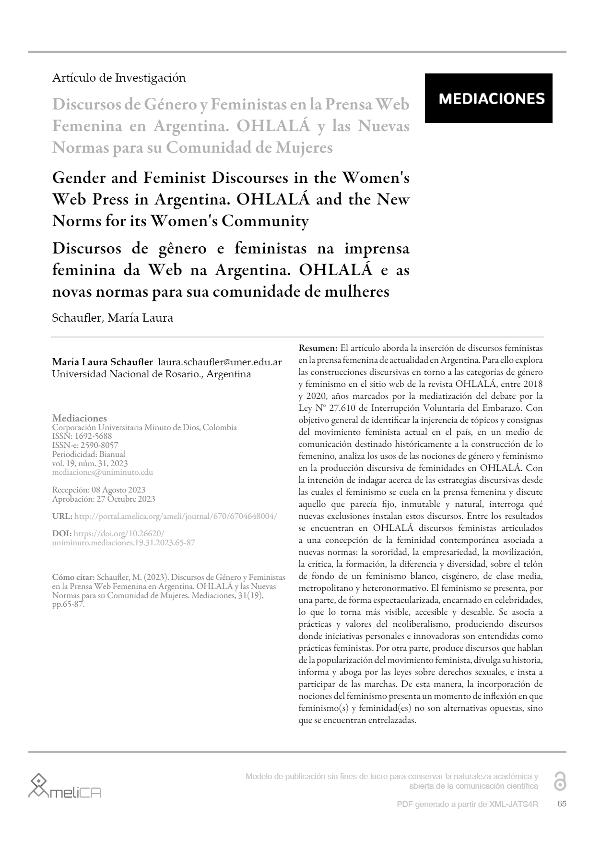Mostrar el registro sencillo del ítem
dc.contributor.author
Schaufler , Maria Laura

dc.date.available
2024-01-02T17:56:12Z
dc.date.issued
2023-11
dc.identifier.citation
Schaufler , Maria Laura; Discursos de Género y Feministas en la Prensa Web Femenina en Argentina: OHLALÁ y las Nuevas Normas para su Comunidad de Mujeres; Corporación Universitaria Minuto de Dios; Mediaciones; 19; 31; 11-2023; 65-87
dc.identifier.issn
1692-5688
dc.identifier.uri
http://hdl.handle.net/11336/222083
dc.description.abstract
El artículo aborda la inserción de discursos feministas en la prensa femenina de actualidad en Argentina. Para ello explora las construcciones discursivas en torno a las categorías de género y feminismo en el sitio web de la revista OHLALÁ, entre 2018y 2020, años marcados por la mediatización del debate por la Ley N° 27.610 de Interrupción Voluntaria del Embarazo. Con objetivo general de identificar la injerencia de tópicos y consignas del movimiento feminista actual en el país, en un medio de comunicación destinado históricamente a la construcción de lo femenino, analiza los usos de las nociones de género y feminismo en la producción discursiva de feminidades en OHLALÁ. Con la intención de indagar acerca de las estrategias discursivas desdelas cuales el feminismo se cuela en la prensa femenina y discute aquello que parecía fijo, inmutable y natural, interroga qué nuevas exclusiones instalan estos discursos. Entre los resultados se encuentran en OHLALÁ discursos feministas articulados a una concepción de la feminidad contemporánea asociada a nuevas normas: la sororidad, la empresariedad, la movilización, la crítica, la formación, la diferencia y diversidad, sobre el telón de fondo de un feminismo blanco, cisgénero, de clase media, metropolitano y heteronormativo. El feminismo se presenta, por una parte, de forma espectacularizada, encarnado en celebridades, lo que lo torna más visible, accesible y deseable. Se asocia a prácticas y valores del neoliberalismo, produciendo discursos donde iniciativas personales e innovadoras son entendidas como prácticas feministas. Por otra parte, produce discursos que hablan de la popularización del movimiento feminista, divulga su historia, informa y aboga por las leyes sobre derechos sexuales, e insta a participar de las marchas. De esta manera, la incorporación de nociones del feminismo presenta un momento de inflexión en que feminismo(s) y feminidad(es) no son alternativas opuestas, sino que se encuentran entrelazadas.
dc.description.abstract
The article addresses the insertion of feminist discourses in current women's press in Argentina. In order to do this, it explores the discursive constructions around the categories of gender and feminism on the website of the OHLALÁ magazine, between 2018 and 2020; years marked by the mediatization of the debate by Law No. 27,610 on the Voluntary Interruption of Pregnancy. With the general objective of identifying the interference of topics and slogans of the current feminist movement in the country, in a communication medium historically destined to the construction of the feminine, it analyzes the uses of the notions of gender and feminism in the discursive production of femininities in OHLALÁ. With the intention of inquiring about the semiotic modalities and discursive strategies from which feminism sneaks into the women's press and discusses what seemed fixed, immutable and natural, it questions what new exclusions these discourses install. Among the results, we have found that in OHLALÁ, feminist discourses are articulated to a conception of contemporary femininity associated with new norms: sorority, entrepreneurship, mobilization, criticism, training, difference and diversity, on the background of a white, cisgender, middle class, metropolitan and heteronormative feminism. Feminism is presented, on the one hand, in a spectacular way, embodied in celebrities, which makes it more visible, accessible and desirable. It is associated with practices and values of neoliberalism, producing discourses where personal and innovative initiatives are understood as feminist practices. On the other hand, it produces a discourse that speaks on the popularization of the feminist movement, spreads its history, informs and advocates for laws on sexual rights, urges to participate in marches. In this way, the incorporation of notions of feminism presents a turning point in which feminism(s) and femininity(ies) are not opposing alternatives but are intertwined.
dc.format
application/pdf
dc.language.iso
spa
dc.publisher
Corporación Universitaria Minuto de Dios
dc.rights
info:eu-repo/semantics/openAccess
dc.rights.uri
https://creativecommons.org/licenses/by/2.5/ar/
dc.subject
FEMINISMO
dc.subject
GÉNERO
dc.subject
PRENSA FEMENINA
dc.subject
DERECHOS SEXUALES
dc.subject.classification
Comunicación de Medios y Socio-cultural

dc.subject.classification
Comunicación y Medios

dc.subject.classification
CIENCIAS SOCIALES

dc.title
Discursos de Género y Feministas en la Prensa Web Femenina en Argentina: OHLALÁ y las Nuevas Normas para su Comunidad de Mujeres
dc.title
Gender and Feminist Discourses in the Women's Web Press in Argentina: OHLALÁ and the New Norms for its Women's Community
dc.title
Discursos de gênero e feministas na imprensa feminina da Web na Argentina: OHLALÁ e as novas normas para sua comunidade de mulheres
dc.type
info:eu-repo/semantics/article
dc.type
info:ar-repo/semantics/artículo
dc.type
info:eu-repo/semantics/publishedVersion
dc.date.updated
2023-12-27T11:48:06Z
dc.identifier.eissn
2590-8057
dc.journal.volume
19
dc.journal.number
31
dc.journal.pagination
65-87
dc.journal.pais
Colombia

dc.journal.ciudad
Bogotá
dc.description.fil
Fil: Schaufler , Maria Laura. Consejo Nacional de Investigaciones Científicas y Técnicas; Argentina. Universidad Nacional de Rosario; Argentina
dc.journal.title
Mediaciones
dc.relation.alternativeid
info:eu-repo/semantics/altIdentifier/url/https://revistas.uniminuto.edu/index.php/med/article/view/3492
dc.relation.alternativeid
info:eu-repo/semantics/altIdentifier/doi/https://doi.org/10.26620/uniminuto.mediaciones.19.31.2023.65-87
Archivos asociados
